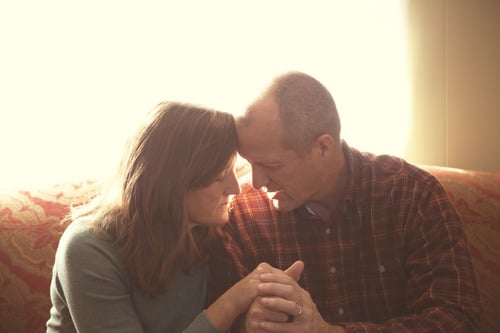
For a moment, he looked surprised! He was in the midst of telling me about how he had been wronged and why it was wrong. He relayed the perfectly reasonable argument he had used with his wife, when I interrupted him to suggest he use his “F” words. No not that “F” word…rather, I’d hoped he would be able to use his feeling words.
So often in my work with couples, I begin by hearing the two sides of what is not working in their relationship. Each seems eager to tell me how the other is wrong and point out the reasonableness of their own argument (or the unreasonableness of the other’s argument!). So I often find myself explaining that couples often have the idea that there is one truth… and of course each person thinks they have it! So I have to explain there is not one “truth”, there are two truths. Each knows what is true for them, but they seem much less aware of what is true for the other.
The task is not to force our own truth on the other, instead the task is to come to understand and respect both truths.
Sitting with couples in this stage can feel like being in court and witnessing two attorneys presenting their cases. This does not bode well for a relationship. When we get into the place of arguing our case, we have moved out of relational mode. We are more in a place of self-concern than in a place of relating. Relating requires a desire to understand and care about each other. It says that we value our own needs, and we value the others too. In arguing mode, the tendency is to blame the other, to point out the shortcomings and errors of the other. Would being on the receiving end of that make you want to listen to the other? It probably doesn’t make them want to hear you either. We tend to need to feel heard before we are able to listen. Which means your partner needs to be heard, and so do you.
As it is unlikely they can hear you just now, you might take a moment and practice a self-compassion break (from the Mindful Self-Compassion program). Pause and open to the pain you are feeling. When you locate the emotion, try to see if you can feel it in your body. Recognize that feeling this way is part of the shared human condition. Others feel this way too, you’re not alone in feeling this way. This is how it feels to be hurt, disappointed, lonely, etc. Then see if you might offer yourself some sort of soothing. Would it help to place a warm, kind hand on the part of the body that is holding the painful emotion? Perhaps there are some words you need to hear right now. What would you say to a friend in that situation? Can you offer yourself the same kindness? Take a few minutes, or longer, to offer yourself your own warm presence. When you feel you’ve been heard, even if it is just by yourself at this point, you’ll be better able to begin to hear the other person.
When you do feel able to open up to what they are saying, leave right and wrong out of it, seek to understand their truth. First see if you can understand what they are saying. Put yourself in their shoes and try to see it from their perspective. Then see if you can understand what they are feeling. Underneath anger are usually softer more vulnerable feelings. Do they feel hurt, abandoned, criticized, embarrassed? Check it out with them to make sure you understand the feeling underneath the upset. Then see if you can take it a little deeper, see if you can understand their need.
We, as human beings, all share certain universal needs. We need to be seen, heard, understood, loved, etc. This does not make us weak, no it just makes us a living human being. See if you can identify the unmet need, then see what you can do to meet that need, if possible.
Perhaps your partner really needs to be reassured. It feels much better to offer reassurance than it does to argue your case in court. At this point, both of you may be feeling much better, but the process really isn’t complete yet. You still need to be heard. You may decide to take a break and come back to this part, or you may decide to continue. After really being heard and understood, your partner is much more likely to be able to show up and listen to you now.
Take a moment and dive underneath your stories of right and wrong.
Perhaps touching back into the self-compassion break. See if you can identify the softer more vulnerable feelings that underlie your upset. Then see if you can identify the universal unmet need that lies beneath the feeling. When you feel ready to speak, keep in mind that you are speaking with someone you care about and see if you can speak with them in a way that is kind and in which you take responsibility for your feelings and needs.
Begin by letting them know what you are feeling in response to this situation. Using “F” words is a skill. Statements like, “I feel hurt because you wronged me” are more blaming than helpful. See if you can keep your focus on you. Be willing to stick with it and be patient while your partner tries to sort out and understand where you are. As long as they are truly making an attempt to understand you, it is helpful to stay with it. If you don’t feel they are genuinely trying to understand then you may decide not to continue to engage in the process right now. If they are genuinely trying to understand, then eventually you may feel the relief of being heard. Listening with the desire to understand another is truly an act of love. Sometimes this is all we need. Is that all you needed?
Take a moment to check in with yourself and see what you need. Then let your partner know what you need. When we love another we hurt when they hurt, and being offered a way to help ease the pain is such a relief. Let your partner know what you need and how they might help with that need. While things might be cleared up by now and you may be feeling much better, don’t get caught in the expectation that it will be possible to make it all better right now. Rather, stay in the moment and take comfort in this one step toward reconciliation. Over time, when we practice the habit of showing up for ourselves and showing up for the other, things improve for us and for the other. It takes courage, commitment, and practice to cultivate this habit, but it is central to our well being and our ability to be in healthy relationships. Use your “F” words!
© Michelle Becker, WiseCompassion.com




